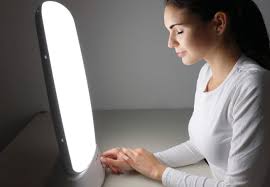After extensive studies, scientists are finally beginning to fully understand the crucial effect that light has on our internal systems, and therefore, our overall health!
Light receptors in our eyes communicate directly with the brain, synchronizing the circadian clocks that affect our immune system, appetite, mood, energy and pain tolerance. When light enters your eyes it’s transmitted directly to a small cluster of brain cells in your hypothalamus called the suprachiasmatic nuclei, or SCN. Your SCN is your body’s master clock, which uses the intensity and colour of the light you see to determine what time of day it is, and then sends various signals to the ‘clocks’ that reside in every tissue of your body. So the cells know what time it is, which is important because the cells perfomr different functions at different times of the day.
For example, daylight has a lot of blue-wavelength rays. When you open your blinds in the morning (you are sleeping in full darkness, right?) those beams enter your eyes and relay a signal to your brain that it’s day. This kick-starts the body processes that keep you alert and awake. It speeds up your metabolism, preparing you for the first meals of the day.
In evening, natural light becomes less blue and more amber until the sun sets. This tells your SCN and your entire body that night is near. Your melatonin production picks up, your metabolism slows down to prep your body with its overnight fast, and your immune system becomes more active to help your body fight any infectious bugs it has picked up during the day. And throughout the night, your body is moving through various organs, to clean and uplift them…call this an ‘internal housekeeping’ of sorts. So you can see that when you snack late into the night, all of these important functions get dulled or pushed aside, as the body tries to digest this sudden intrusion of food (remember, the body always has to digest first, that is its survival strategy). And when you compound this with fast food snacks, then we have double trouble with the deleterious effects of late night eating. It also upsets our body’s natural clocks.
Unfortunately, in today’s artifical and commerialized world, our SCN responds to all light, including artificial. And today, we spend more time inside, bombarded with artifical rays from computers, electronics, lamps, fluorescent tubes, TV’s, phones….in fact, research says we are exposed to 10x more light than we had 50 years ago…our health can unravel pretty quickly. “The body starts operating out of rhythm, and that sets the stage for obesity, low energy, chronic stress and more serious problems like cancer and heart disease,” says Dr. Czeisler, Ph.D., the director of the division of sleep and circadian disorders at Brigham and Women’s Hospital in Boston.
And of particular importance is sunlight. As we lather up with sun blocks (most are again, chemicalized and artificial), we have created an atmosphere of fear around sunlight. Or many people go to the opposite and overdo it through sunbathing. Neither extreme is good for the body or the soul. Moderation is still key here, also because we are losing the protetive ozone layer. And it has been proposed that sunblock creams and lotions can actually increase our risk of cancer, because it is blocking one of the most important dietary nutrients that ward off cancer – Vitamin D (another reason why those of us living in the northern climates – above the equator – like Canada and northern U.S. should supplement with 3000-5000 IU of vitamin D a day…throughout the year).
RESETTING our LIGHT METERS: Fortunately, getting your body clock back on schedule and keeping it there is achievable, and relatively easy to do. But you will be asked to make some lifestyle changes. Here are a few to initiate into your daily life. Remember, change requires that something changes…sounds obvious, but most of us resist change. When you embrace the positive benefits, then making changes are easy!
Sit in Sun for 15 minutes a day: Spend 15 minutes a day with your eyes closed and pointed toward the sun! Morning sun is optimal, as research has shown that the morning rays promote a lower BMI (body mass index) and a positive mental shift that is twice as strong as other times in the day. And light affects your body’s production of leptin and grehlin, the two hormones that control appetite and regulate metabolism. Light also improves insulin sensitivity and affects positive hormone production.
Brighten your Work Space: People that sit by a window at work who get more natural light are happier overall and experience deeper, more restful (and longer) sleep. If you don’t have a window, consider screwing a blue-enriched white lightbulb into your desk lamp.
Eat Lunch Outdoors: Try eating outdoors for at least 30 minutes (before 3 p.m.). Short stints in the sun will keep your circadian cyle on track, which will make it less likely that your circadian rhythms will be disrupted with artifical lights.
Prep for the 2 p.m. slump: This mid day slump is univeral, and is directly related to your circadian clock (that’s why it’s important to have energizing foods versus loads of processed or carb filled foods that will induce sleepiness!). Our cycles are split into two 12-hour sections, and the second section peaks between 2 and 4 p.m. This is the ideal time to sneak in a quick nap, but unfortunately, many of us don’t have that luxury. So ducking back outside to ingest some rays is beneficial. This is also a good time to train, and an excellent time to NOT indulge in sugary carbs…often the very thing you want to perk you up, but it drops you lower a short while after!
Lower the lights before bed: This gives your SCN ample time to prep for night time and to start producing melatonin. Backlit electronics like your phone, tablet and TV give off blue rays that studies show are enough to block the production of melatonin.
Skip the evening snack: Also one of the best weight loss tips, not snacking at night keeps your internal clocks on pace. When we head into night, our pineal gland produces melatonin, which reduces the effectiveness of insulin, which helps your muscles absorb glucose from food, which results in your body’s sugar spiking higher than it would during the day. It increases weight gain and predisposes you to diabetes (and yes, this ‘snack’ refers to alcohol too).
Total Bedroom Blackout: It’s well documeted that total blackness allows for maximum melatonin production, which induces sleep. And melatonin is a powerful antioxidant that boosts your immunity and has cancer-fighting properties. If you can’t find absolute dark, consider a sleep mask.
What about artificial lights in winter time? Science has long shown the positive effects of light devices to ward of SAD (seasonal affect disorder) and immune disorders, and these small ‘light boxes’ can be purchased easily.
The use of indoor tanning booths can also be beneficial, although the risk of cancer and other disorders increases with use, so limit yourself to 10-20 minutes a day). For protection, use an aloe vera gel before and after tanning, drink plenty of water, and ensure the booth bulb are changed regularly. With indoor or outdoor tanning, the key is to never allow your skin to burn. Less is more, so build into it slowly. When outdoors, use a natural sunblock, which features titanium dioxide, tyrosine and aloe (check with your nearest health food store).



